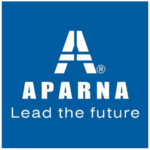
Technology adoption in Building materials industry by Mr T Chandra Sekhar, Director – Technical, Aparna Enterprises
For over a decade now, adoption of technology has been the core focus of industries all around the world. The million dollar question they face is “How to adopt technology practices that would suit their ecosystem?” Digitisation and automation are no longer futuristic concepts and have become imperative part of industries.
Even the building materials industry is no stranger to this paradigm shift. The industry which traditionally has been highly dependent on manual labour, has also been significantly adopting new age technologies to optimize production, maximize output and create seamless manufacturing process. Let’s take a look at some of the key areas where technology is re-defining the building materials industry:
- Artificial Intelligence and Robotic Process Automation in the manufacturing and packing process of tiles:With artificial intelligence being incorporated into the production process, long repetitive tasks have been automated and the productivity has also improved. Many companies are completely automating the processes like mixing raw materials, cutting & polishing tiles and segmenting & packing tile units; all of which used to be manual once upon a time. This is not only efficient but it also ensures uniform quality across products. Introduction of digital printing technology in tiles has expanded the range of designs that can be produced. This advancement also leads to client satisfaction as this enables tile manufacturers to print designs their customers want, while retaining important features and properties of the given tile. The incorporation of nanotechnology in polishing has enabled tiles to look shinier, and has improved its surface consistency and durability.
- The automation of the production process of Ready Mix Concrete (RMC):Cement mix is the foundation of any construction process; both literally and figuratively. Most RMC plants today are fully computerised, completely armed with precise and automatic processes to produce the highest quality cement mix in large amount of batches. Perhaps the most practical application of technology in this segment would be the customization of moisture ratio in the cement mix and transportation of RMC. In the past, mixing of cement and the transportation of this cement to the higher floors was a laborious and time consuming process. Thanks to the highly efficient pumping technology today, the transportation of the cement mixture is a productive, efficient and automated process.
- Use of advanced German and Italian technologies to manufacture doors and windows Technological advancements are also slowly bringing international standards to the manufacturing process of raw materials. Especially in the case of uPVC and aluminium. uPVC and aluminium are the most sought after materials for windows and doors today. Not only are the windows and doors made of these materials totally recyclable, but they are also manufactured with absolute precision using advanced German and Italian technologies without a lot of human intervention. This brings in many benefits like more room for customisation, a more uniform finish in the look and feel of the products, enhanced durability and quality, the ability to experiment with designs and efficient locking systems.
- Use of technology to improve the quality of raw materials:Good quality raw materials provide the base for every great product. Raw materials are the core, and hence their quality becomes critical. Adoption of technology and enabling of automation has made companies immensely improve the superiority of the raw materials that they use. An example of an efficient application of technology and automation would be the new machines equipped with automation technology that produce and sort Crushed Rock Fines and Manufactured Sand. Manufactured sand is a cost effective and efficient alternative to river sand. As an added bonus, it minimises environmental impact and saves the river beds; all the more reason to adopt new and efficient technology.
The building materials industry is swiftly striving towards adopting more technology practices today. As the industry largely depends on manual work force, the disruption in operations due to ongoing pandemic served as an example and emphasised the need to be technologically adept and future ready. More and more companies today are realising that augmentation and automation are the way forward and these will soon become critical for business continuity for building materials segment.
